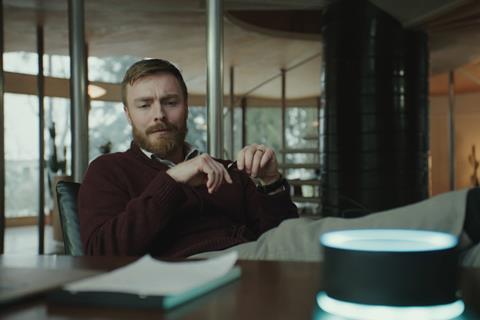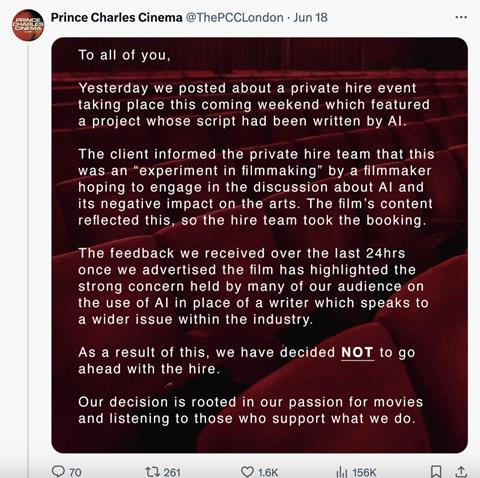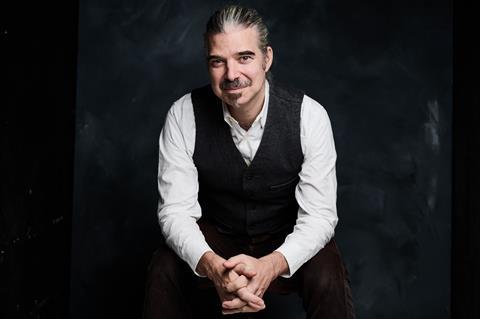
The director of a film entirely written using artificial intelligence has spoken of his shock after the Prince Charles Cinema in London cancelled its world premiere screening.
The world premiere of Peter Luisi’s The Last Screenwriter, whose script was created entirely by ChatGPT, was due to have been held on Sunday (June 23).
The Prince Charles Cinema in London’s Soho announced this week it had axed the screening after receiving customer feedback highlighting “strong concern” about “the use of AI in place of a writer.” In a statement shared on Instagram and X, the cinema said the response of its customers “speaks to a wider issue within the industry.”
Swiss filmmaker Luisi told Screen that the whole intention of screening his film “had been to start a conversation” about the impact of AI on the film industry.
He said the cinema shouldn’t have been scared off from screening the film “just because a few people are upset – you can never do anything that everyone likes, especially with this subject.”
He added that the decision to cancel the screening in response to online reactions proved how heightened passions are at the moment about AI.
“Judging by the many comments on Twitter following their statement, most people would have been happy to watch the film and have a discussion about it.”
Social media debate

Screen contacted Prince Charles Cinema for comment, and the cinema referred to its statement on social media.
Reactions to the statement on Instagram and X have been mixed. One writer said he was more concerned about London arts venues cancelling events based on social media outrage than the threat from AI. “Maybe the discussion would have been worth having. Guess we’ll never know.” Another accused the Prince Charles of ‘bowing to the mob’ and saying the discussion about AI would have been worth having.
Others praised the cinema for its “integrity” and said that “as an independent cinema this is the stance you should be taking with industry issues.”
Experimental filmmaking
Luisi claims The Last Screenwriter is the first known feature-length script generated by ChatGPT to be filmed – and stresses its experimental nature. A co-writer of Switzerland’s 2007 Oscar entry Vitus, Luisi has previously directed, written and produced eight features including hit local comedy Bon Schuur Ticino (2023).
The script for The Last Screenwriter is knowingly self-aware on AI. It centres on a celebrated screenwriter who realises that AI not only matches his skills, but surpasses him.
Luisi says his goal is to show what is possible with AI and to contribute to the industry discussion about the potential impact of the technology on filmmaking. Nobody will profit from The Last Screenwriter, which Luisi was going to screen at the Prince Charles Cinema before offering it for free online on a dedicated website (www.lastscreenwriter.com). He has also published all documentation around the film’s creation, including the prompts he gave ChatGPT and the script he received back, on the website.
He shot the 76-minute feature in January with a cast of professional UK actors. The point of the exercise, he explains, was, “Can we take a script written by AI and then make the best movie possible?”
Reputation management
Luisi says he was told that by the Prince Charles Cinema that it “lives off its reputation” with its audience, so the movie was watched before being approved for screening.
He then paid for Prince Charles Cinema to advertise the screening to its audience, booking two posts on X (formerly Twitter), two on Facebook and one newsletter. “They have the perfect, interested film audience, for this film. That’s why we went to that cinema,” says Luisi.
Shortly the first X post went out, Luisi says he got a call from the cinema saying it couldn’t advertise the screening any more because “there were so many negative reactions.” But he was told the screening itself could still go ahead.
The next morning, Luisi got another call from the cinema saying it would have to cancel the screening because, overnight, 160 people complained about the film.
“At that point, I was almost happy because I was worried that people would come and sabotage the screening by booing,” confesses Luisi.
The screening, he says, was meant to be “a sort of celebration to show the film and people who made it.” A Q&A was also planned about the film and the use of AI. “It would have been a great Q&A session,” says Luisi.
Festival debate

“I like to say it’s a film by filmmaker for filmmakers,” says Luisi. “We’re a small, independent Swiss production company. We’re not a big studio, and we’re not trying to make money off of this. I think it is an important for everyone to take a look at it.”
Adds Luisi: “I even think, honestly, that the film should help the cause of screenwriters, because people might be astonished that you can write a movie already without a person.”
He had submitted the film to the Locarno Film Festival, which didn’t select it. He’s not heard why, but wonders if it might be problematic for a festival to air it as well. “The problem is, if they show this film, then other people are going to say, ‘What, you are showing a movie written by a computer? And you’re not showing a movie by so and so?’ It’s something people are just afraid of. Nobody wants to get on the wrong side of this debate. Festivals also have their reputation [to think of].”
Luisi had planned to release the film online on July 11, but is now debating whether to bring its online launch forward in light of the online debate that has erupted in wake of the screening cancellation.
The cancellation comes as the film industry wrestles with the rapid growth of AI technology. Last year’s actors and writers’ strikes were partly motivated by concerns about the impact of AI.
Earlier this month, Annecy Film Festival audience members booed the screening of French music video Etoile Filante, which was made using generative AI software. It prompted Annecy’s artistic director Marcel Jean to defend to Screen the selection of films made partially using artificial intelligence.






![The Brightest SunScreen[Courtesy HKIFF]](https://d1nslcd7m2225b.cloudfront.net/Pictures/274x183/3/5/0/1448350_thebrightestsunscreencourtesyhkiff_312678.jpg)


















No comments yet